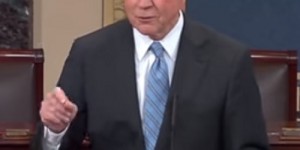Scott Walker has a mixed history when it comes to illegal immigration.
He backed the Kennedy-McCain amnesty back in 2006 and as late as 2013 supported a “path to citizenship” for illegals and opposed increased border security.
More recently, as chatter of Walker as a Presidential candidate heated up, he’s sounded more and more like an immigration patriot.
In an interview on FOX News, Walker famously denounced his past amnesty support and said “My view has changed,” Walker said. “I’m flat out saying it.”
However, just a few days later media reports surfaced that Walker:
told a group of New Hampshire Republicans at a private dinner that he “backed the idea of allowing undocumented immigrants to stay in the country and to eventually become eligible for citizenship.”
So, a potential Walker candidacy had ample ground to take almost any position on immigration.
Walker recently discussed the issue with Glenn Beck where he became the first declared or potential 2016 GOP presidential candidate to stake out a position on immigration fully in line with that of Senate Judiciary Committee subcommittee on Immigration and the National Interest chairman Sen. Jeff Sessions (R-AL).
In terms of legal immigration, how we need to approach that going forward is saying—the next president and the next congress need to make decisions about a legal immigration system that’s based on, first and foremost, on protecting American workers and American wages, because the more I’ve talked to folks, I’ve talked to Senator Sessions and others out there—but it is a fundamentally lost issue by many in elected positions today—is what is this doing for American workers looking for jobs, what is this doing to wages, and we need to have that be at the forefront of our discussion going forward.
Walker spent some time discussing his evolution on the amnesty issue and how his views have changed over the last decade.
Walker discussed how in the past he did support amnesty, but says he doesn’t anymore, because he has learned more about the issue. That shows him to be one of the most open-minded GOP candidates on such matters. Walker went on to say:
As I said, I think when Chris Wallace a few weeks back, when I was on Fox News Sunday, asked me about this, he said. ‘did you change your position at least from some of these views from a decade ago’ and I said, ‘yeah.’ I think the American people not only want people who stand firm on issues, but people who listen to folks who have got rational thoughts and for me a lot of it was talking not just to citizens all across the country but to governors in border states who face real serious concerns about what’s happening on our border and elsewhere.
Walker says he discussed immigration policy in depth with Texas Gov. Greg Abbott when he visited the border a few weeks ago. He said that he doesn’t think he was “directly wrong” before but didn’t have a “full appreciation for what is the risk along our border.” He continued:
I knew there were people traveling, coming across the border, but really what you have is much greater than that. What you have is international criminal organizations, the drug cartels aren’t just smuggling drugs—they’re smuggling firearms and smuggling not only humans but trafficking and horrific situations. It’s an issue that’s not just about safety or about national security, it’s about sovereignty. If we had this kind of assault along our water based ports, the federal government would be sending in the navy. And yet there is a very minimal force along our land-based borders, be it New Mexico, Texas, Arizona, or California, and so to me it was clearly far bigger than immigration.
We need to have a much bigger investment from the federal government to secure the border, through not only infrastructure but personnel and certainly technology to do that and to make a major shift. If you don’t do that, there’s much greater issues than just immigration. Folks coming in from potentially ISIS-related elements and others around the world, there’s safety issues from the drugs and drug trafficking and gun trafficking and gun things with regard—but to get to immigration you have got to secure the border, because nothing you do on immigration fundamentally works if you don’t secure that border.
Walker also discussed the need for interior enforcement:
Then I think you need to enforce the law and the way you effectively do that is to require every employer in America to use an effective E-Verify system and by effective I mean you need to require particularly small businesses and farmers and ranchers. We got to have a system that works, but then the onus is on the employers and the penalties have to be steep that they’re only hiring people who are here, who are legal to be here. No amnesty, if someone wants to be a citizen, they have to go back to their country of origin and get in line behind everybody else who’s waiting.
This development, perhaps one of if not the biggest of the 2016 presidential campaign so far, comes as Walker has taken a commanding lead in polls in all three of the first GOP primary states: Iowa, New Hampshire, and South Carolina.
Clearly, the immigration issue has moved from the fringe in the GOP to the mainstream. If a top tier Presidential candidate like Walker feels the need to stake out bone fides on amnesty, it means all the grassroots work done has made an impact.




























